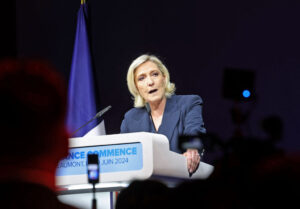For Dominique Venner, the time had come to die. The 78-year-old man entered Notre-Dame de Paris. He walked intently; every step brought him closer to the end. He knew there was no going back. “A successful death is one of the most important acts in one’s life,” he had written years earlier.
Venner stopped in front of the altar. A large, golden cross stood above him. It gleamed in the afternoon light. Venner went down on one knee. He took out an envelope from his jacket pocket, put it on the altar. Then, discreetly, he took out a gun. There was only one bullet in it; it was all he needed.
Venner opened his mouth wide, slid the gun into it. He could feel the cold metal against his tongue. Calmly, Venner put his finger on the trigger and pressed. A blast followed. Blood splashed on the altar. The date was 21 May 2013.
This was no ordinary suicide. Venner was a French far-Right intellectual who thought of himself as a samurai. His suicide was inspired by that of Yukio Mishima, the Japanese nationalist author who committed seppuku in 1970 in the wake of a failed coup. He had always wanted to end his life in a similar way. He killed himself to send a message to his French compatriots. He had picked Notre-Dame to do it, he told friends, because it was “the most symbolic place to call out to our people”.
Hours after Venner’s death, his suicide note was made public. “In the evening of my life, facing immense dangers to my French and European homeland, I feel the duty to act as long as I still have strength,” Venner wrote. “I give myself over to death to awaken slumbering consciences. I rebel against fate. I protest against poisons of the soul and the desires of invasive individuals to destroy the anchors of our identity, including the family, the intimate basis of our multi-millennial civilisation. While I defend the identity of all peoples in their homes, I also rebel against the crime of the replacement of our people.”
More than a decade after his suicide, Venner continues to cast a long shadow over French politics. Last Sunday, the National Rally, the party of Marine Le Pen, won a resounding victory in the first round of the legislative elections. It’s now on the brink of power. This would have been impossible without Venner’s influence. He theorised the political strategy — often called dédiabolisation (de-demonisation) — that normalised the French far-Right.
Renaud Dély, a French journalist who wrote a gripping biography of Venner, said that “Marine Le Pen is the heir of the ideological project and method of Dominique Venner”. Le Pen, in fact, paid homage to Venner after his suicide in 2013. “All our respect to Dominique Venner,” she posted on X, “whose final, eminently political act was to try to wake up the people of France.” According to Dély, Le Pen also sent an emissary to Venner’s funeral. He told attendees that his boss was there “through thought”.
To understand Venner’s legacy, we must first know his life story. Venner was born in 1935 into a well-to-do family. His father was an architect who built churches, as well as a member of the French Popular Party, a pro-Nazi party that was disbanded after the Second World War.
In 1954, aged 19, Venner volunteered to serve in the Algerian War. At the time, the country wasn’t merely a French colony — it was a French department. But Algerians wanted their independence. It was Venner’s worst nightmare. “In Algeria, we are fighting for ourselves, for our dignity, and to keep our property, a land acquired by right of conquest, blood and sweat,” he said at the time. “We fight for our race!” And Venner fought hard. In hunting down Algerian nationalists, he proved to be a ruthless, even sadistic soldier. His superiors felt his conduct went too far: Venner was too reckless and put other soldiers in jeopardy.
After a two-year stint in Algeria, Venner returned to metropolitan France seething with rage. Military authorities were too complacent. In his mind, they lacked the guts to do what was needed to keep Algeria French. Moreover, as he had learned, it was the politicians in Paris who called the shots. If Venner wanted to make a difference, it would have to be through political militancy. And so Venner entered the far-Right underground. He became a member of Young Nation, a nationalist group, and was soon taking part in violent attacks. His targets: supporters of Algerian independence, communists, socialists, bourgeois, minorities.
At the height of the Algerian War, in 1958, Charles de Gaulle returned to power and founded the Fifth Republic. Venner saw him as the enemy. In 1940, de Gaulle had sided against Vichy. And now, Venner believed, he was about to sell out French Algeria. “General de Gaulle prefers métèques [derogatory term for non-white people] to his officers,” he wrote.
Venner went on to join the OAS, a nationalist group that opposed Algerian independence and staged terrorist attacks. In 1961, aged 26, he was arrested for his involvement in a failed military coup against de Gaulle. The sentence: 18 months behind bars.
In the silence of his prison cell, as Dély explains in his book, Venner came to a realisation that would change the course of French politics. In hindsight, it seems obvious. But, at the time, it represented a paradigm shift. The far-Right would never be the same again.
His realisation was that the far-Right would never gain power through insurrection. Instead, if it hoped to govern someday, it had to win at the ballot box. In modern democracies, violence wasn’t only inefficient — coups, as Venner knew first-hand, could easily fail — but it also turned ordinary people off. The OAS hadn’t managed to keep Algeria in French hands or even boost the cause of French Algeria. “Indiscriminate terrorism is the best way to cut yourself off from a population,” Venner wrote. “It’s a desperate act.”
The far-Right, Venner now believed, had to forsake violence if it was serious about one day implementing its violent project. Drawing on Lenin, he argued that revolution was “less about seizing power than about using it to build a new society”. To do that, the movement needed to develop a coherent ideology and create an organisation to spread that ideology in society.
But — and this is the most important part — the far-Right couldn’t be transparent about its ideology. The reason: ordinary people were brainwashed. “Through permanent one-way propaganda, to which everyone is subjected from childhood,” Venner wrote, “the regime, in its many forms, intoxicates the French people.” The far-Right had to outwit the regime. “A revolutionary struggle, a fight to the death against an all-powerful, wily, experienced adversary, must be fought with ideas and cunning rather than force.”
As such, it was necessary for the far-Right to hide its true nature. People weren’t ready for it. Instead, without abandoning its core tenets, it should adapt its appearance. In Dély’s pithy phrase, the far-Right should “know how to change its attire to better reassure and seduce”.
Venner had been mulling this strategy for a while. Back in 1959, when he had founded the Nationalist Party, a violent group which would soon be dissolved, Venner had told new recruits that they should be careful about what they said in public. “Never discuss subjects that may shock newcomers by the way you present them,” he had warned them. “For example, the métèque problem must never in a presentation or a conversation be approached with the perspectives of the crematorium or the soap dish.” In other words, never say that you ultimately want to exterminate all métèques. When you are a fascist, you can kiss but you can never tell.
Shortly after leaving jail in 1962, Venner published his pamphlet. Titled Pour une critique positive (Towards a Positive Criticism), it became a self-help manual for generations of French far-Right activists, for whom Venner is the closest thing they have to an Antonio Gramsci. With his bold, iconoclastic text, he laid the ideological groundwork for the National Rally to become the most popular party in France. And he pioneered the strategy of dédiabolisation that has been at the heart of Marine Le Pen’s political career.
For years now, commentators have marvelled at how Le Pen detoxified the party she inherited from her father, Jean-Marie, a convicted Holocaust denier. In 2015, she even expelled him from the party for making antisemitic comments. Since then, Le Pen has worked hard to soften her rhetoric. For instance, she doesn’t use the loaded term “Great Replacement” anymore; instead, she talks about “mass immigration”. And unlike her erstwhile rival Eric Zemmour, she doesn’t limit herself to talking about the threat of “Islamic extremism”. She has spent considerable time talking about economic issues.
Le Pen has also nurtured a new generation of far-Right leaders who don’t raise their voices or go off-script. With their tailored suits, they look like respectable politicians. Jordan Bardella, the National Rally’s 28-year-old president, is the prototype. Tipped to become prime minister if the party wins this Sunday, Bardella is the face of dédiabolisation. He smiles so much his face is frozen in a rictus. It should come as no surprise that his speechwriter, Pierre-Romain Thionnet, is a Venner devotee.
But it would be a mistake to assume that Le Pen and Bardella are the first to put dédiabolisation into action. In fact, the strategy’s use can be traced to the presidential campaign of far-Right candidate Jean-Louis Tixier-Vignancour in 1965. A lawyer for the OAS, his candidacy marked a turning point for the nationalist camp: for the first time since the Second World War, they were seeking power at the ballot box. That, in and of itself, was an act of dédiabolisation. Vignancour was advised by — you guessed it — Venner. And his campaign director was none other than Jean-Marie Le Pen.
Vignancour won only 5% of the vote, but a seed had been planted. It blossomed in 1972 when the National Front — as the National Rally used to be called — was founded. The party was the brainchild of François Duprat, another far-Right activist who was influenced by Venner. Jean-Marie Le Pen was picked to lead it because he was seen as a far-Right moderate. That might be hard to believe today, but, in his day, Le Pen too contributed to dédiabolisation. A charismatic speaker, he helped popularise far-Right ideas in French society. In the space of 30 years, he united the movement and brought it to the second round of the presidential elections in 2002.
This was no accident. A National Front memo from 1985 shows that dédiabolisation is baked in the DNA of the party. It reads: “We are surrounded by hostile forces… In public, we must only evoke what our propaganda lets appear of the tip of the iceberg… We cannot impose on the masses outside the movement just any ideas. We must always start from a pre-existing mental substratum and blend it with our own key ideas.” Venner couldn’t have phrased it any better. And Marine Le Pen couldn’t have implemented it any better.
Over the past decade, Le Pen has not only ditched her father but also her most extreme positions. Gone are the calls for Frexit. Even in the last few weeks, whenever its programme came under scrutiny, the National Rally has moderated its policies or pushed back their eventual enactment. Banning the veil worn by Muslim women, for instance, would only happen in 2027 at the earliest. The end goal is obvious: to assuage fears and appeal to moderate voters.
And yet, despite the National Rally’s softening, it would be unwise to forget Venner’s influence on the movement. This was a man who was willing to sacrifice himself for his mission — a man who understood the power of the long game.
Disclaimer
Some of the posts we share are controversial and we do not necessarily agree with them in the whole extend. Sometimes we agree with the content or part of it but we do not agree with the narration or language. Nevertheless we find them somehow interesting, valuable and/or informative or we share them, because we strongly believe in freedom of speech, free press and journalism. We strongly encourage you to have a critical approach to all the content, do your own research and analysis to build your own opinion.
We would be glad to have your feedback.
Source: UnHerd Read the original article here: https://unherd.com/




